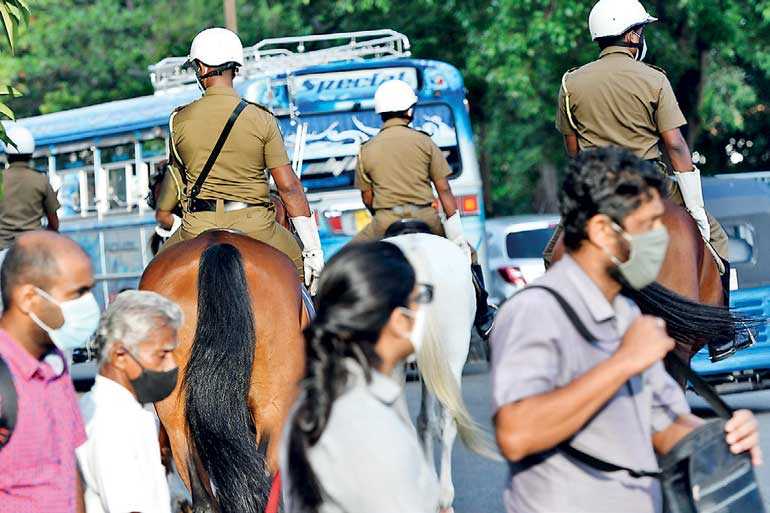Monday Feb 16, 2026
Monday Feb 16, 2026
Tuesday, 24 November 2020 00:51 - - {{hitsCtrl.values.hits}}

Working men and women need to be attentive to developments to ensure that they will not be co-opted within the political agenda of the Government and be pitted against each other based on identities of gender, race, language, religion and region – Pic by Shehan Gunasekara
By Working People’s Research Group
The Budget 2021 records a critical juncture within the Sri Lankan economy. At one level, the budget illustrates the neoliberal crisis that has been unfolding over the last four decades. Also, it renews the promise of development, ‘the poverty free economy’ for the 75th time.
In parallel, we are encountering the existential threat posed by the ecological crisis of which COVID-19 is a premonition. How the global economy will evolve within the next year or two is also a cause of concern. Regional geopolitical tensions between India, China, Japan and the US also put pressure on Sri Lanka as a small island economy.
Policy contradictions, lies and desperation evident throughout the Budget suggests that the Government is oblivious. How would the confluence of the capitalist and ecological crises affect the failing promise to the working people? What kind of conflicts would this result in?
And most importantly, what forms of possibilities would these conflicts arising from the crisis of legitimacy that the neoliberal capitalist policies are undergoing create for the movements of working people? In our opinion, the task for the organised working class, students and political activists today is to understand imminent challenges and how to confront them in the coming months and years.
On the surface, the Budget appears to be a deviation from the neoliberal form of capitalism hitherto practised and implemented since 1977. It indicates a shift towards a development position moored on the import-substitution policy of restricting imports and rejuvenating forces of domestic production, in a combination of foreign capital.
However, the language of comparative advantage, substandard budgetary allocations, draining Government revenue, nurturing private sector monopolies in vital areas of the economy like agriculture and the undertone of dismantling the public sector through structural transformations to embrace private sector values and flexible labour laws expose a desperate attempt to veil the neoliberals behind.
The proposal to increase the daily wage of the plantation workers to Rs. 1,000 will not be implemented unless it is placed in the gazette or incorporated in the collective bargaining agreement. Moreover, the Budget disregards the unique developmental needs of people living in post-conflict societies in the north and east. Limited intervention in reducing single-use plastic reveals a refusal to address the issue of climate change.
Budget 2021 is presented at a time when the entire working population in Sri Lanka is going through enormous difficulties. More than 100,000 working men and women in the garment sector have lost their jobs. Wages of a majority of the working people are slashed to a half. Thousands of livelihoods of farmers and fishers have been decimated.
Burgeoning household debt is a time bomb about to be burst by risking millions of working men and women. The underfunded public health system is under a shock unable to handle the spread of COVID-19 virus. Public education system forced to redesign methods of learning and teaching is revealing deep-seated inequalities in our society which have been repetitively ignored by the policymakers.
Instead of expanding ‘economic freedom’ of the working people, market reforms have only deepened inequality, led to various forms of dispossession among low-income people, suicides of farmers and microfinance victims, imprisonment, displacement and destitution of the working people.
The Budget 2021 will contribute towards further polarisation of the classes. Revenue depletion will increase post-budget indirect taxes. Public debt crisis will deteriorate. These developments will discriminate against low-income people who are already leading difficult lives. The neoliberal undercurrents will become dominant as the Government seek to privatize SOEs, education, health care, ports, and container terminals and commercialise and commodify land, water, minerals and other natural resources.
The proposed Free Trade Agreements, Commercial Cities and the Millennium Challenge Agreement in the context of intensifying geopolitical tensions will multiply the effects of labour and land reforms. The Government will try to manipulate existing economic grievances to consolidate governance by define and rule.
Working men and women need to be attentive to these developments to ensure that they will not be co-opted within the political agenda of the Government and be pitted against each other based on identities of gender, race, language, religion and region. An alliance between students, working people and political activists will enable a broad front of solidarity to lead the political struggle to reclaim democracy and restructure the economy to prioritise the fulfilment of human needs and ecological sustenance of the planet. Rallying against the right-wing economic project accompanies the struggle for alternative left politics.
(Working People’s Research Group is a collective of trade unionists, political activists and researchers working on issues of political economy.)